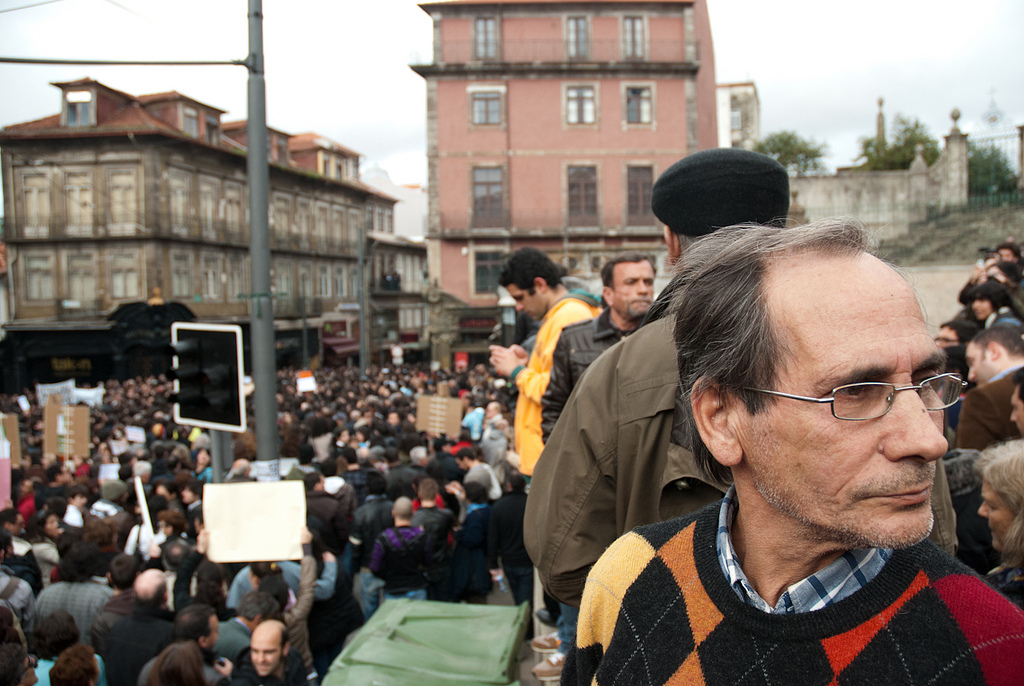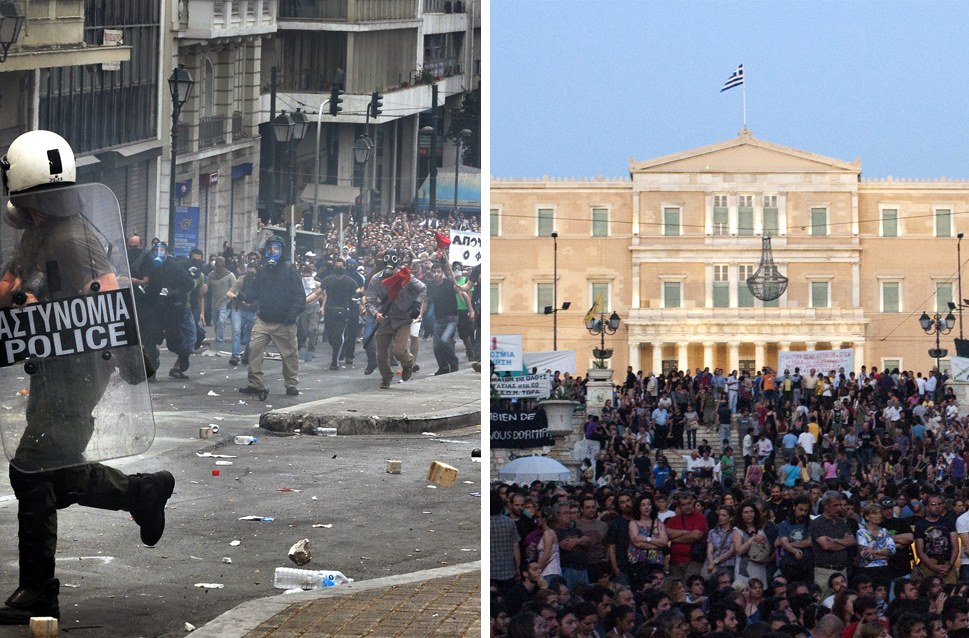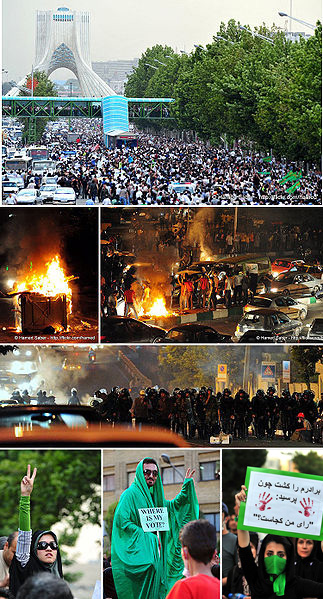|
2011 Spanish Protests
The anti-austerity movement in Spain, also referred to as the 15-M Movement (Spanish: ''Movimiento 15-M''), and the Indignados Movement, was a series of protests, demonstrations, and occupations against austerity policies in Spain that began around the local and regional elections of 2011 and 2012. First starting on 15 May 2011, many of the subsequent demonstrations spread through various social networks such as Real Democracy NOW ( es, link=no, Democracia Real YA) and Youth Without a Future ( es, link=no, Juventud Sin Futuro). Spanish media related the movement to the 2008–14 Spanish financial crisis, the Arab Spring, as well as demonstrations in North Africa, Iran, Greece, Portugal, and Iceland. The movement was also compared to Stéphane Hessel's political manifesto '' Time for Outrage!,'' which was seen to empower Spanish youth who were not in school, training, or employment. Protestors rallied against high unemployment rates, welfare cuts, politicians, and the two-part ... [...More Info...] [...Related Items...] OR: [Wikipedia] [Google] [Baidu] |
Protest Camp
Protest camps are physical camps that are set up by activists, to either provide a base for protest, or to delay, obstruct or prevent the focus of their protest by physically blocking it with the camp. Protest camps may also have a symbolic or reproductive component where 'protest campers' try and recreate their desired worlds through the enactment of protest camp infrastructures (such as communal kitchens, child care, environmentally friendly composting toilet or use of grey water systems) or through the modes of organising and governance (e.g. direct democracy). Camping on and/or occupying land has a long history which can be traced back to nomadic cultures as well as the 17th century Diggers. However, the use of protest camps as a contemporary form of protest can be linked back to the US civil rights movement of the 1960s and, specifically, "Resurrection City", a protest camp held in May 1968 in Washington, D.C. as part of the Poor People's Campaign. In the United Kingdom publi ... [...More Info...] [...Related Items...] OR: [Wikipedia] [Google] [Baidu] |
Anti-austerity Protests In Portugal
The 12th March Movement ( pt, Movimento 12 de Março) or the Geração à Rasca (, "struggling generation") protest took place in more than 10 cities of Portugal against the economic crisis and labour rights. They were the biggest events since the 1974 Carnation Revolution and organized without support from political parties or trades unions. A Facebook event and a blog, created by a group of friends—Alexandre de Sousa Carvalho, João Labrincha and Paula Gil—were the starting point. Background A number of musical acts in Portugal had been involved in protest actions against the austerity measures at the beginning of the crisis. Music addressing Portugal's political situation became a part of local and national political protest narratives, which found music playing an important role in protests in Portugal—as they have since the Portuguese Revolution culminating in the 25 April coup in 1974. Among this music was traditional Portuguese music and instruments including ... [...More Info...] [...Related Items...] OR: [Wikipedia] [Google] [Baidu] |
Anti-austerity Protests In Greece
The anti-austerity movement in Greece involved a series of demonstrations and general strikes that took place across the country. The events, which began on 5 May 2010, were provoked by plans to cut public spending and raise taxes as austerity measures in exchange for a bail-out, aimed at solving the Greek government-debt crisis. Three people were killed on 5 May in one of the largest demonstrations in Greece since 1973. On , anti-austerity activists organised by the Direct Democracy Now! movement, known as the Indignant Citizens Movement ( el, Κίνημα Αγανακτισμένων Πολιτών, ''Kínima Aganaktisménon-Politón''), started demonstrating in major cities across Greece. This second wave of demonstrations proved different from the years before in that they were not partisan and began through peaceful means. Some of the events later turned violent, particularly in the capital city of Athens. Inspired by the anti-austerity protests in Spain, these demons ... [...More Info...] [...Related Items...] OR: [Wikipedia] [Google] [Baidu] |
2009-2010 Iranian Election Protests
After incumbent president Mahmoud Ahmadinejad declared victory in the 2009 Iranian presidential election, protests broke out in major cities across Iran in support of opposition candidates Mir-Hossein Mousavi and Mehdi Karroubi. The protests continued until 2010, and were titled the Iranian Green Movement ( fa, جنبش سبز ''Jonbesh-e Sabz'') by their proponents, reflecting Mousavi's campaign theme, and Persian Awakening, Persian Spring or Green Revolution.Yarshater, EhsaPersia or Iran, Persian or Farsi, ''Iranian Studies'', vol. XXII no. 1 (1989) Protests began on the night of 12 June 2009, following the announcement that incumbent President Mahmoud Ahmadinejad won nearly 63 percent of the vote, despite several reported irregularities. However, all three opposition candidates claimed the votes were manipulated and the election was rigged, with Rezaee and Mousavi lodging official complaints. Mousavi announced he "won't surrender to this manipulation", before lodging an off ... [...More Info...] [...Related Items...] OR: [Wikipedia] [Google] [Baidu] |
North Africa
North Africa, or Northern Africa is a region encompassing the northern portion of the African continent. There is no singularly accepted scope for the region, and it is sometimes defined as stretching from the Atlantic shores of Mauritania in the west, to Egypt's Suez Canal. Varying sources limit it to the countries of Algeria, Libya, Morocco, and Tunisia, a region that was known by the French during colonial times as "''Afrique du Nord''" and is known by Arabs as the Maghreb ("West", ''The western part of Arab World''). The United Nations definition includes Morocco, Algeria, Tunisia, Libya, Egypt, Sudan, and the Western Sahara, the territory disputed between Morocco and the Sahrawi Republic. The African Union definition includes the Western Sahara and Mauritania but not Sudan. When used in the term Middle East and North Africa (MENA), it often refers only to the countries of the Maghreb. North Africa includes the Spanish cities of Ceuta and Melilla, and plazas de so ... [...More Info...] [...Related Items...] OR: [Wikipedia] [Google] [Baidu] |
Arab Spring
The Arab Spring ( ar, الربيع العربي) was a series of anti-government protests, uprisings and armed rebellions that spread across much of the Arab world in the early 2010s. It began in Tunisia in response to corruption and economic stagnation. From Tunisia, the protests then spread to five other countries: Libya, Egypt, Yemen, Syria and Bahrain. Rulers were deposed (Zine El Abidine Ben Ali, Muammar Gaddafi, Hosni Mubarak, Ali Abdullah Saleh) or major uprisings and social violence occurred including riots, civil wars, or insurgencies. Sustained street demonstrations took place in Morocco, Iraq, Algeria, Lebanon, Jordan, Kuwait, Oman and Sudan. Minor protests took place in Djibouti, Mauritania, Palestine, Saudi Arabia and the Moroccan-occupied Western Sahara. A major slogan of the demonstrators in the Arab world is '' ash-shaʻb yurīd isqāṭ an-niẓām!'' (). The importance of external factors versus internal factors to the protests' spread and success ... [...More Info...] [...Related Items...] OR: [Wikipedia] [Google] [Baidu] |
2008–2014 Spanish Financial Crisis
The 2008–2014 Spanish financial crisis, also known as the Great Recession in Spain or the Great Spanish Depression, began in 2008 during the world financial crisis of 2007–08. In 2012, it made Spain a late participant in the European sovereign debt crisis when the country was unable to bail out its financial sector and had to apply for a €100 billion rescue package provided by the European Stability Mechanism (ESM). The main cause of Spain's crisis was the housing bubble and the accompanying unsustainably high GDP growth rate. The ballooning tax revenues from the booming property investment and construction sectors kept the Spanish government's revenue in surplus, despite strong increases in expenditure, until 2007. The Spanish government supported the critical development by relaxing supervision of the financial sector and thereby allowing the banks to violate International Accounting Standards Board standards.. The banks in Spain were able to hide losses and earnings v ... [...More Info...] [...Related Items...] OR: [Wikipedia] [Google] [Baidu] |
Democracia Real Ya
''Democracia'' ( am, ዴሞክራሲያ, 'Democracy') is the organ of the Ethiopian People's Revolutionary Party. It was launched as a clandestine weekly newspaper in July 1974, as the Central Committee of the Ethiopian People's Liberation Organization (as the EPRP was known at the time) returned to Ethiopia from exile.Tiruneh, Andargachew. The Ethiopian Revolution 1974–1987 : a Transformation from an Aristocratic to a Totalitarian'. Cambridge: University of Cambridge, 1995. p. 75 At the time the EPRP was often known simply as the ''Democracia'' group, as the existence of the party was not publicly known.Tiruneh, Andargachew. The Ethiopian Revolution 1974–1987 : a Transformation from an Aristocratic to a Totalitarian'. Cambridge: University of Cambridge, 1995. p. 394 Overview ''Democracia'' quickly acquired a significant readership in the student and trade union movements. Along with its sister publication ''Abyot'' (which had become associated with EPRP), ''Democracia'' playe ... [...More Info...] [...Related Items...] OR: [Wikipedia] [Google] [Baidu] |
Social Network
A social network is a social structure made up of a set of social actors (such as individuals or organizations), sets of dyadic ties, and other social interactions between actors. The social network perspective provides a set of methods for analyzing the structure of whole social entities as well as a variety of theories explaining the patterns observed in these structures. The study of these structures uses social network analysis to identify local and global patterns, locate influential entities, and examine network dynamics. Social networks and the analysis of them is an inherently interdisciplinary academic field which emerged from social psychology, sociology, statistics, and graph theory. Georg Simmel authored early structural theories in sociology emphasizing the dynamics of triads and "web of group affiliations". Jacob Moreno is credited with developing the first sociograms in the 1930s to study interpersonal relationships. These approaches were mathematically fo ... [...More Info...] [...Related Items...] OR: [Wikipedia] [Google] [Baidu] |
Spanish Regional Elections, 2011
The 2011 Spanish regional elections were held on Sunday, 22 May 2011, to elect the regional parliaments of thirteen of the seventeen autonomous communities—Aragon, Asturias, the Balearic Islands, the Canary Islands, Cantabria, Castile and León, Castilla–La Mancha, Extremadura, La Rioja, Madrid, Murcia, Navarre and the Valencian Community—, not including Andalusia, the Basque Country, Catalonia and Galicia, which had separate electoral cycles. 824 of 1,218 seats in the regional parliaments were up for election, as well as the 50 seats in the regional assemblies of Ceuta and Melilla. The elections were held simultaneously with local elections all throughout Spain. The week before the elections came dominated under the scope of the 15-M protests which had been held in different cities across Spain. The opposition People's Party (PP) won the elections in a landslide as the ruling Spanish Socialist Workers' Party (PSOE) lost all regional governments at stake—including Extr ... [...More Info...] [...Related Items...] OR: [Wikipedia] [Google] [Baidu] |
Spanish Municipal Elections, 2011
The 2011 Spanish local elections were held on Sunday, 22 May 2011, to elect all 68,230 councillors in the 8,116 municipalities of Spain and all 1,040 seats in 38 provincial deputations. The elections were held simultaneously with regional elections in thirteen autonomous communities, as well as local elections in the three foral deputations of the Basque Country and the eleven island councils in the Balearic and Canary Islands. The days before the elections were marked by the 2011 Spanish protests which had been held in different cities across Spain since 15 May. The elections resulted in a landslide victory for the opposition People's Party (PP) and other centre-right parties, which won control of all of Spain's largest cities. In Barcelona, held by PSOE-sister party, the Socialists' Party of Catalonia (PSC), since the first local elections in 1979, was won for the first time by the nationalist Convergence and Union (CiU), which also won in Girona. The PSOE only won only ... [...More Info...] [...Related Items...] OR: [Wikipedia] [Google] [Baidu] |






